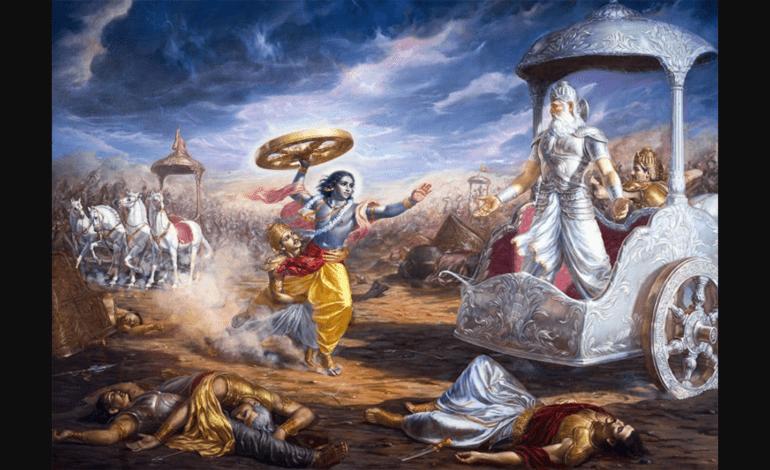
Shreemad Bhagwat Gita – As I understand: Chapter Four
By Rajendra Kapil | 847-962-1291
The fourth chapter of the Bhagavad Gita begins with the revelation of divine knowledge. Lord Krishna tells Arjuna, “The wisdom I am sharing with you is divine and eternal. I first imparted this sacred knowledge at the beginning of this creation cycle to Surya, the Sun God. Surya passed it on to his son Manu, and Manu shared it with King Ikshvaku. Thus, this knowledge was passed down through the royal lineage. Over time, however, it was nearly lost. Now, I am reviving it by imparting it to you.”
At this point, Arjuna raises a doubt. He asks, “Your birth is in this present age. How could you have shared this knowledge with the Sun God at the beginning of creation?”
To this, Lord Krishna replies, “You have a limited life span, Arjuna. But I am the eternal Brahman. Both you and I have taken many births, but I remember them all—while you do not.”
Lord Krishna then reveals a great secret—the reason for His divine incarnations:
“Yadā yadā hi dharmasya glānir bhavati Bhārata,
Abhyutthānam adharmasya tadātmānaṁ sṛijāmyaham.”
Translation:
O Bharata (Arjuna), whenever righteousness declines and unrighteousness rises, I manifest Myself on Earth.
In this shloka, Lord Krishna clearly states for all devotees: whenever righteousness diminishes and chaos from unrighteousness spreads across the world, He incarnates in some form to restore balance and dharma. At such times, His divine mission is to annihilate evil and provide refuge to the virtuous.
This is what He did in the Treta Yuga by incarnating as Lord Rama, and in the Satya Yuga as Narasimha to protect Prahlad. Similarly, He has appeared in many other ages to protect dharma.
Wise people, free from fear and attachment, recognize this divine form and surrender to Him completely. They dedicate all their actions to Him, live for Him, and at the end of their lives, they attain Him. With complete devotion, they worship Him—which pleases the Lord deeply. He embraces their pure love and accepts them fully.
“Chāturvarṇyaṁ mayā sṛiṣṭaṁ guṇa-karma-vibhāgaśaḥ,
Tasya kartāram api māṁ viddhyakartāram avyayam.” (Verse 13)
“Na māṁ karmāṇi limpanti na me karma-phale spṛihā,
Iti māṁ yo’bhijānāti karmabhir na sa badhyate.” (Verse 14)
Translation:
Based on the three gunas (Sattva, Rajas, Tamas) and corresponding actions, I created the fourfold division of society: Brahmin, Kshatriya, Vaishya, and Shudra. Though I am the creator of this system, know Me to be beyond action and eternal.
Actions do not bind Me, nor do I have any desire for their results. Whoever truly understands this is not bound by their own actions either.
Lord Krishna explains that the caste divisions seen in society were created by Him—not to cause inequality, but to allow each individual to serve society according to their innate nature and abilities.
The learned—those who teach and study the Vedas and scriptures—are called Brahmins. Those skilled in warfare and who protect society are Kshatriyas. The Vaishyas are involved in trade and economic structure. And Shudras support society through essential labor and services. No role is lesser than another. Each deserves equal respect, including those doing humble tasks, who are just as worthy of honor as a warrior or merchant.
“Sarvāṇīndriya-karmāṇi prāṇa-karmāṇi chāpare,
Ātma-saṁyama-yogāgnau juhvati jñāna-dīpite.” (Verse 27)
“Dravya-yajñās tapo-yajñā yogayajñās tathāpare,
Svādhyāya-jñāna-yajñāś cha yatayaḥ sanśita-vratāḥ.” (Verse 28)
Translation:
Some control their senses and offer their vital energies into the fire of self-discipline, kindled by knowledge.
Others perform sacrifices through giving wealth, penance, yoga, or through scriptural study and strict vows.
To attain this divine knowledge, some engage in intense austerities; others immerse themselves in prayer and meditation. Some turn to yoga, while others study scriptures like the Vedas and Puranas. Yet, all strive toward the same goal—union with the Divine.
Sitting at the feet of the Lord, they experience supreme grace and divine bliss.
“Apare niyatahārāḥ prāṇān prāṇeṣu juhvati,
Sarve’pyete yajña-vido yajña-kṣapita-kalmaṣāḥ.” (Verse 30)
Translation:
Some reduce their food intake and offer breath into breath as a sacrifice. All these practitioners, knowing the meaning of yajña, are purified of sin.
Some choose the path of yajña (sacrifice), which holds immense power. The fire of yajña burns away countless sins. Just like fire can consume anything—good or bad—knowledge, too, is like a flame. It purifies and transforms the devotee, leading them toward divinity.
The path of yajña thus guides the yogi toward the divine realm.
“Ajñaś chāśraddadhānaś cha samśayātmā vinaśyati,
Nāyaṁ loko’sti na paro na sukhaṁ samśayātmanaḥ.” (Verse 40)
Translation:
One who lacks knowledge, faith, and is full of doubt is surely lost. Such a doubtful soul finds no happiness—neither in this world nor in the next.
Here, the Lord also gives a stern warning: those who ignore this sacred knowledge and immerse themselves in worldly pleasures lose the true purpose of human life. Doubt surrounds them, and they descend into lower states of existence. They find no peace—either in this life or the next.
That is why my humble advice to you is: relinquish all doubts. If you still feel uncertain, destroy those doubts with this divine weapon of wisdom. Purify your mind and actions, and with renewed vigor, rise in your natural duty as a Kshatriya. Prepare yourself for battle—and leave the rest to Me.
Purity of thought and clarity of purpose will undoubtedly lead you to your ultimate destination. This is My promise to you. Always believe that I am eternally by your side.
Jai Shri Krishna!